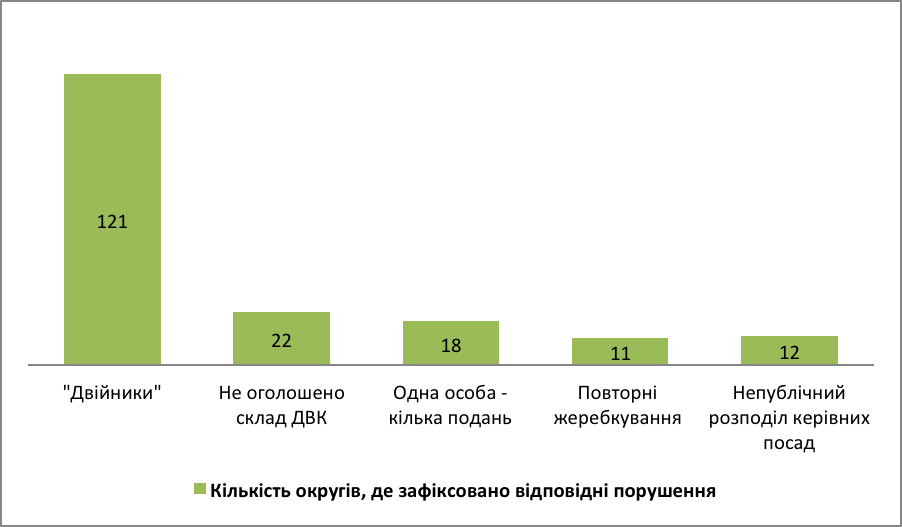According to the preliminary results of observation conducted by OPORA, only 7 of 21 districts in Donetsk oblast and 6 of 11 districts in Luhansk oblast have almost completed the procedures, related to the formation of PECs. Precinct election commissions (PECs) are still not formed in some districts of Donbas due to the constant armed aggression of pro-Russian terrorist groups. Nevertheless, PECs were formed without major violations and within time constraints established by the law on the whole territory of Ukraine. With the exception of some incidents (in Dnipropetrovsk, Zhytomyr, Lviv, and Kharkiv oblasts), district election commissions didn't hinder legitimate activities of civic observers. In general, procedural violations and abuses, reported by observers of CN OPORA, were not systematic or planned.
According to the calculations of Civil Network OPORA observers as of 10 October 2014, district election commissions have formed 29,101 precinct election commissions, consisting of 469,296 persons[1]. Besides that, in accordance with the the Article 29 of the Law, the CEC has formed 113 precinct election commissions for the overseas polling stations.

Electoral and Parliamentary Programs Coordinator at Civil Network OPORA Olha Aivazovska stated: “Doubles” in the nominee lists, as well as candidates that cannot be PEC members make the most frequent procedural violations, noted by the OPORA observers at the phase of precinct election commission formation. Violations of this kind, first of all, are due to the irresponsible attitude of parties and candidates, who do not appropriately select their PEC nominees and do not verify existing lists of nominees." Another frequent violation that parties and candidates commit is submission of nominations by one person on behalf of several subjects. The most frequent violations committed by DECs were due to the lack of experience of DEC members (repeated sortitions) or due to their deliberate attempt to “simplify” or modify established electoral procedures at their sole discretion. In particular, observers noticed numerous violations committed by DEC heads, who, contrary to the law, did not announce PEC lists based on sortition results, or distributed managing positions at closed meetings.
OPORA's analyst Oleksandr Neberykut stated: "As of 14 October, only 7 of 21 DECs in Donetsk oblast finished creation of PECs (DECs #46, 47, 48, 50, 57, 58, and 59). However, 9 districts of the region (#41-44, 51, 54, 55, 56, and 61) are controlled by illegal groups, and it's impossible to observe the formation of PECs there." At the same time, there is a great concern about formation of PECs in district #49, controlled by the legal government. The DEC hasn't managed to form PECs yet in this district. It should be mentioned that the DEC #49 has no access to the Vybory analytical information system, and manually performs PEC formation procedures. Yet, the process of PEC formation is under way, in spite of exceeding the time limits prescribed by the law.
Olha Aivazovska, Electoral and Parliamentary Programs Coordinator of the Civil Network OPORA, stated: "In Luhansk oblast, 6 of 11 DECs (#104, 106, 107, 112, 113, 114) have finished a little delayed formation of PECs. Despite the obvious danger, election subjects submitted enough nominees necessary to complete formation of PECs. However, OPORA observers draw attention to the fact that the quality of nominations for PEC membership is not satisfactory." Nominations were made hurriedly, without the appropriate examination of candidates and often without their personal confirmation of their agreement to participate in PECs. This will lead again to wide-scale PEC member rotations and will have an additional destabilizing effect upon the election process. The rest of the DECs in Luhansk oblast, located in the territories controlled by the terrorist groups, struggle to complete formation of PECs with great difficulties and with infringements of the prescribed time limits.
Civil observers have reported incidents (in Kirovohrad, Luhansk, and Cherkasy oblasts), where the sortition was performed after the time limits prescribed by the Law (after 11:59 PM on 10 October). More frequently, there were “repeated” sortitions (Volyn, Dnipropetrovsk, Kyiv, Lviv, Kharkiv, Khmelnitskyi Cherkasy, and Chernihiv oblasts), where sortitions results were annulled and the procedure was repeated again. The reasons for the “repeated” sortitions were procedural mistakes made by the DECs while processing nominee lists.
The procedure for distributing managing positions among the subjects nominating representatives to precinct election commissions was established by district election commissions in accordance with the Resolution of the CEC # 80 of 04/18/2013 [2]. At this stage, observers have not revealed any substantial violations. However, OPORA observers have evaluated the process of distributing managing positions in the certain election districts (Volyn, Dnipropetrovsk, Ivan-Frankivsk, Ternopil, Cherkasy oblasts) as insufficiently open to the public.
With the exception of some incidents (in Dnipropetrovsk, Zhytomyr, Lviv, and Kharkiv oblasts), DECs didn't hinder legitimate activities of civic observers. In general, procedural violations and abuses, reported by observers of Civil Network OPORA, were not systematic or planned.
REPORT on completion of election commission formation